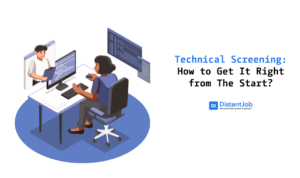How Does The Vetting Process Guarantee That The New Software Developer Is Ready To Take On The Challenge?
Finding the most fitting candidate for a job opening is not an easy feat. You’ll need to evaluate their experience, skills, personality, work ethic, and team fit, among other factors. An unsuitable candidate will cost you, above all, time and money, so it’s important to have a strong vetting process to help you identify the right people for the job straight away.
Knowing how to vet tech candidates is an essential part of hiring top talent in the tech industry. But how exactly is this process conducted? To help you, we’ll share some of our top tips developed in over 15 years of finding the very best remote talent for our clients.
What Is The Vetting Process?
The candidate vetting process consists of screening candidates to ensure that they have the necessary skills and cultural fit to succeed in the role they are applying for. Vetting candidates involves conducting a thorough evaluation of their qualifications, background, and work history to determine whether they are a good fit for the job and the company.
What Does The Vetting Process Look Like?
A typical vetting process will feature the following steps:
1) Review Of The Candidate’s Resume And Application Materials
This initial screening is designed to filter any candidates who do not meet the basic qualifications for the role, such as education or experience requirements. Remote interview In this step, interviewers will ask questions designed to assess the candidate’s skills, experience, and cultural fit. This may include technical questions to test the candidate’s abilities, behavioral questions to gauge their personality and work style, and situational questions to assess how they handle specific scenarios.
2) Reference Checks, Background Checks, And Developer Skill Testing Assessment
These additional steps are designed to provide a more complete picture of the candidate’s qualifications and ensure that they are a good fit for the role.
Ultimately, the candidate vetting process is critical for ensuring that companies hire the right people for the job. By taking the time to carefully screen candidates, companies ensure that new hires are better suited for the job and fit the company culture, potentially reducing turnover.
📚 Related: How to Optimize the IT Recruiting Process Timeline?
Why Is It Important To Vet Tech Candidates in Remote Businesses?
When hiring tech talent for remote roles, traditional recruitment methods are often not enough to ensure you’ll find someone suitable for the job. Remote work comes with its own challenges that recruiters should be able to assess during the hiring process.
Here are the two biggest reasons why the vetting process is so important when dealing with remote candidates:
- Reduces employee turnover rates: Remote work requires self-motivation, discipline, and the ability to work independently. Candidates who are not suited to remote work may struggle with its unique challenges and eventually quit. The cost of replacing an employee can be expensive, especially if he’s a valuable expert, so it’s essential to vet remote candidates thoroughly to ensure they will be able to work without issues.
- Reduces the risk of security breaches: Remote work naturally poses unique security challenges, and businesses need to be confident that their employees can navigate these risks and not put their data in jeopardy. By vetting candidates’ work experience and assessing their technical skills, businesses can ensure that they are hiring someone who can keep their sensitive data safe.
Best Practices For Vetting Tech Candidates
At DistantJob we help the clients we support vet candidates all day, every day. We’ve gained a lot of experience with what works and what doesn’t – here’s what we’d suggest you include in your process:
Take Up References
Getting a response to a reference request was a time-consuming task that often didn’t get completed until your new starter was on site and working. With more rapid communication, it’s now possible to get opinions from previous employers or other referees within hours.
If you can, set up a phone call to talk to the ex-employer; this will enable you to move past the cookie-cutter responses of a generic reference and let you ask the questions that matter to you, such as how that person worked under pressure, or what part of the stack they are familiar with.
Evaluate Technical Talent
The traditional way of vetting tech candidates was the infamous whiteboard test. We’ve talked about the problems with that approach in the past, but in effect, it relies on the developer having a good memory rather than proving their ability to problem-solve with all the knowledge of the internet at their fingertips.
Instead, new methods of evaluating technical talent such as coding challenges have emerged, and they are great tools to evaluate their personality, problem-solving skills, and team fit as well!
Beyond the Interview
We’ve found that the best indicator of a ‘good fit’ isn’t so much about technical skill, it’s more to do with cultural fit.
Employees perform better if they feel a sense of belonging to your team, so you need to make sure that their expectations of work align with yours. Take some time in the interview to discuss expectations in terms of working hours, even if all you need is some overlap once a week for a team meeting.
If you want to learn a little more about your candidate, you could ask them to attend the interview from their usual working space. You could also ask for a ‘tour’ of their home office, so you can get an idea of some of those important personal traits like organization, time management, and how effectively they separate work from their home life.
Remote Experience
Although many people now have worked from home, they may not have had the full experience. Working at home continuously and in the long term has its own challenges and isn’t for everyone. One of the best ways to vet a software engineer for a remote role is to choose someone who has previous remote experience.
If they haven’t got a track record of delivering online, then you’ll need to ask your vetted candidate questions about how they might face some of those challenges. We’re talking about things like distraction, time management, and what they will do if they find themselves in need of help when no one else is online. Scenario-based questions are the easiest way to get someone to explain their approach.
💡 Further reading: Best IT Recruitment Tips for Beginners
Automated Vetting Tools: When Do You Need Them?
Automated vetting tools can be especially useful when you’re dealing with a large volume of applicants. In these cases, automated tools can help you save time and effort in the initial screening process.
Automated tools can also be helpful for testing key skills and qualifications, such as programming languages or certifications, that are necessary for the job. This can help ensure that you’re filtering the candidates who meet the basic technical requirements for the role.
If you’d like to use these automated tools to help during your vetting process, here are some of the most popular coding interview platforms out there:
- Coderpad – This platform supports over 40 coding languages and offers a three-stage testing process, online assessment, a ‘take-home’ project, and a live coding interview.
- CoderByte – Calling themselves the #1 platform for technical evaluation, Coderbyte supports some big names like Microsoft, Intel, and Full Stack Academy. With over 1000 coding challenges for developer skill testing, your potential candidates.
- CodinGame – You can get a coding test set up in as little as a minute with this website that’s used by the likes of Ubisoft and Apside. This is also a collaborative coding interview platform.
- Tests4Geeks – While the name may be a little ‘on the nose’, this is another coding site that can help you determine your candidate’s coding skills. You send the developer a link, they complete the test, and you get an email letting you know how well they’ve done.
Tech Skills To Look For And How To Test Them
Tech skills are essential for developers, so it’s important to test them thoroughly to make sure you’re making the best choice. They will vary from business to business, as there isn’t a one-size-fits-all, but we can give you an indication of what to do based on general knowledge.
Here are some of the most crucial tech skills to look for in potential hires and how to test them:
1. Programming Languages
By far one of the most important skills for a tech candidate, knowing how to code in the appropriate languages for a job is imperative to success. Depending on the type of job, you should also test your candidate’s knowledge in relevant frameworks and libraries.
How to test: One of the most effective ways to evaluate a candidate‘s programming skills is by giving them a coding test. These can take the form of online coding challenges, take-home assignments, or coding interviews.
2. Database Management
Databases are used in the majority of tech applications, so having an expert on their management and manipulation is essential. Depending on your needs, you can opt for SQL variants or even NoSQL types.
How to test: Thoroughly testing database management is hard to do in a small amount of time, but good options here are database design challenges or SQL coding assignments.
3. Security
As technology advances and holds ever more information about our lives, security becomes paramount for end-user trust. If your business requires a layer of security for any reason, make sure your candidate is versed in security protocols, including authentication, access control, and encryption.
How to test: The best way to test a candidate’s knowledge of security protocols is by giving them an assignment that involves implementing security measures in an existing application.
4. Cloud computing
With the rise in prominence of cloud computing, this is a key skill to test if your business pivots around this recent technology. They should be proficient in any cloud platforms you deal in like AWS, Azure, or Google Cloud, and should know how to deploy, manage, and monitor applications on the cloud.
How to test: You can assess a candidate’s cloud proficiency by asking them to explain their experience working with cloud platforms, their experience in deploying applications on the cloud, and any cloud-related certifications they might have.
5. Agile Methodology
Agile methodology has become a staple in software development, and you’ll want your candidate to be familiar with it so they can be integrated from day 1. Candidates should have experience working in an Agile environment and should know how to use tools such as Jira, Trello, or Asana.
How to test: Ask your candidate about their experience working with Agile methodologies, their experience using Agile tools, and how they have contributed to the Agile process in their previous jobs.
Struggling to Find The Perfect Match? Leave It To DistantJob
If you don’t have the resources to vet candidates for yourself, you can outsource the recruitment process and leave it in specialists’ hands. Do you know who can help you do that? That’s right – us!
We have spent the last fifteen years supporting businesses to find the very best in global technical talent, and we’d love to help you do the same. From the moment you give us your job description we’ll work to bring you a shortlist of amazing, pre-vetting candidates to help you find the right person for your team.
If that sounds like a good option for you, get in touch today with us online or visit us in our Montreal office.





